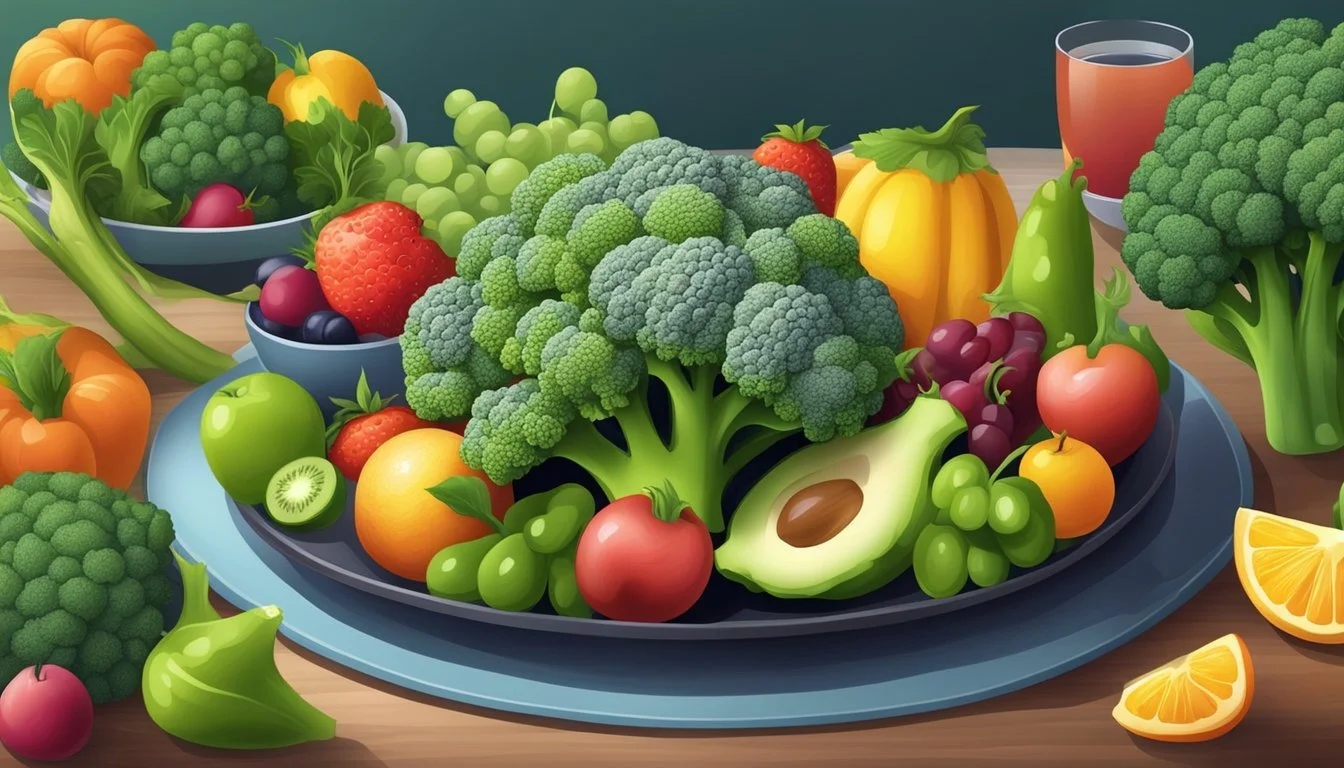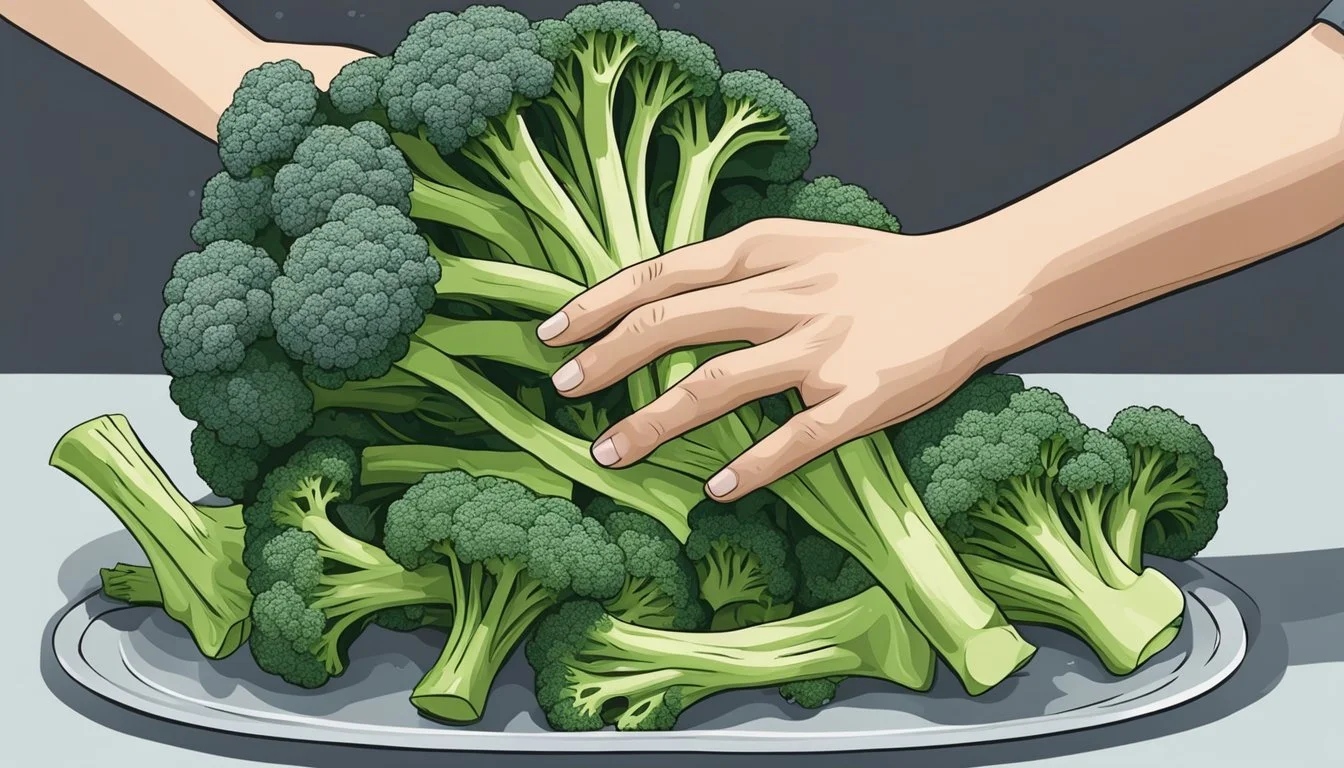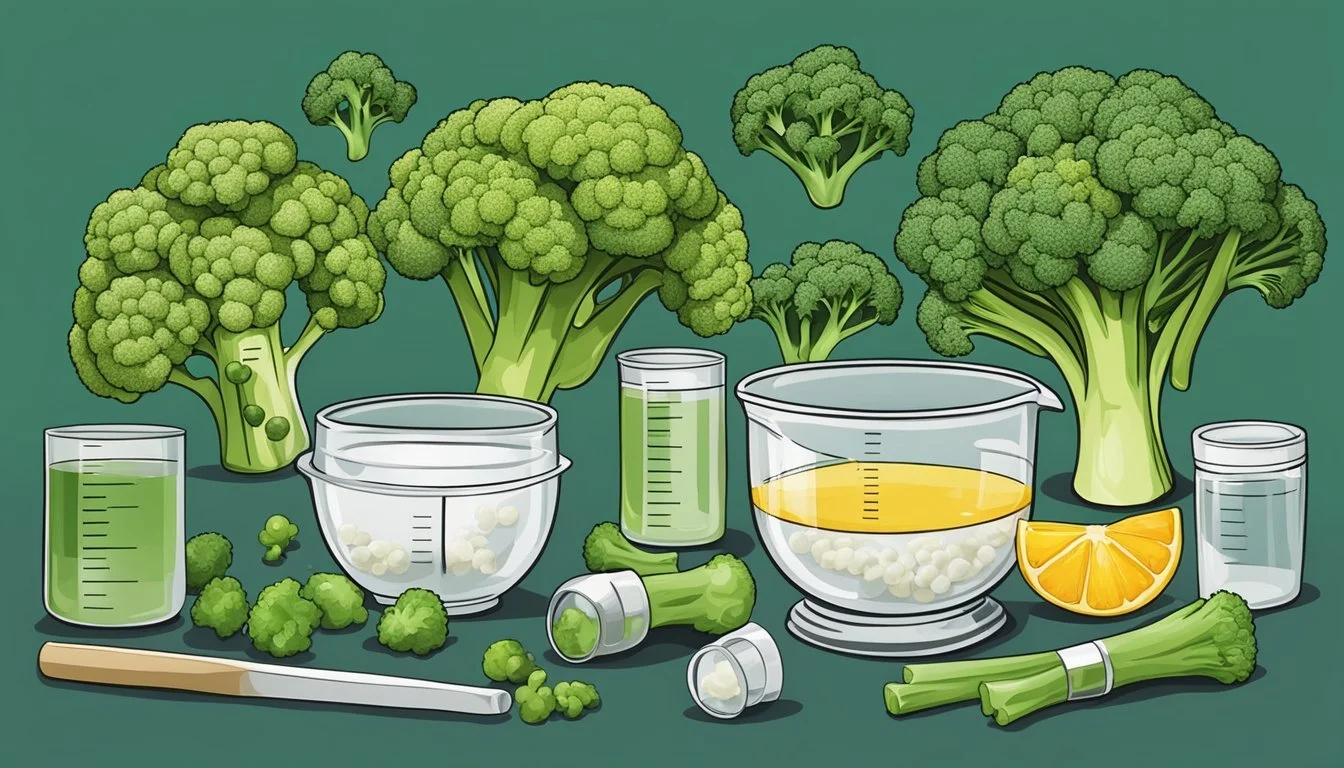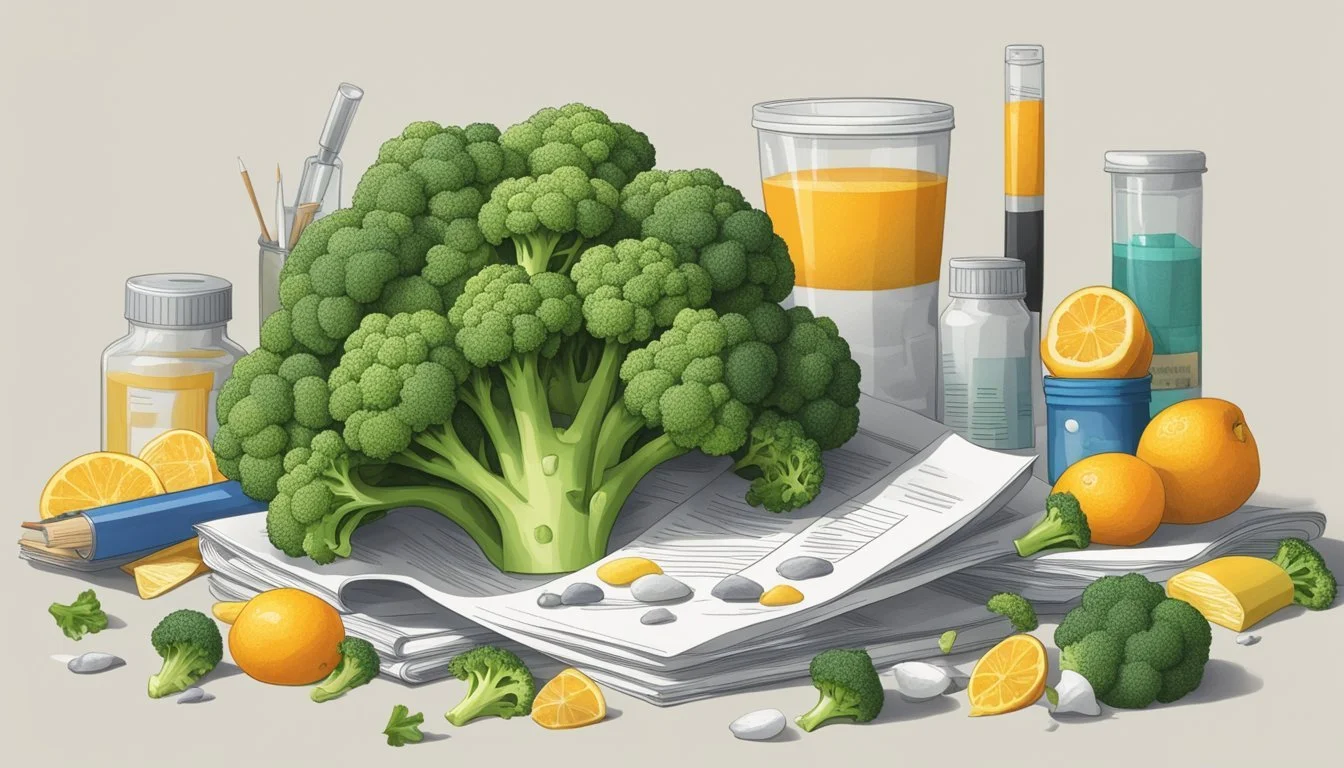How Many Cups of Broccoli for Vitamin C Intake
Daily Recommendations
Vitamin C is an essential nutrient that plays a pivotal role in many bodily functions, including the formation of collagen, absorption of iron, and maintenance of a healthy immune system. While citrus fruits are often the go-to sources for this vitamin, vegetables, particularly broccoli, are also excellent providers. One cup of raw broccoli not only delivers approximately 81 milligrams of vitamin C but also supplies a range of other important nutrients with minimal calories.
Integrating a variety of vegetables into one's diet ensures a more comprehensive uptake of essential vitamins and minerals. Broccoli, as a cruciferous vegetable, offers more than just vitamin C—it's also rich in vitamins A, K, and minerals like potassium. When considering daily vitamin C needs, which range from 45 to 120 milligrams depending on age and sex, broccoli can be a prominent part of the dietary solution. Consuming just one cup of broccoli could contribute significantly to meeting these daily requirements, showcasing the vegetable's dense nutritional profile.
It is important for individuals to assess their own dietary goals and health needs when determining the appropriate amount of broccoli or any vitamin C-rich food to consume. Eating a balanced diet that includes a variety of nutrients is crucial for overall health, and broccoli's versatility in the kitchen can make it an easy and delicious addition to many meals.
Nutritional Profile of Broccoli
Broccoli is a powerhouse of nutrients, providing an array of vitamins and minerals while being low in calories. It is a good source of dietary fiber and protein with minimal fat content.
Vitamins and Minerals in Broccoli
Vitamin C: One cup of chopped raw broccoli (about 91 grams) provides approximately 81 milligrams of Vitamin C, which is about 135% of the daily recommended intake.
Vitamin K: The same serving offers around 116% of the daily value for Vitamin K.
Folate (Vitamin B9): There is 16% of the recommended daily intake of folate in one cup of broccoli.
Potassium: Essential for heart health, broccoli provides this mineral in moderate amounts.
Calcium: Important for bone health, broccoli contains calcium, though not as much as dairy sources.
Vitamin A: While not as high as in carrots or sweet potatoes, broccoli contains some Vitamin A, important for vision and immune function.
The mineral content in broccoli supports overall health, with noteworthy amounts of calcium and potassium which are vital for bone and heart health, respectively.
Caloric Value and Macronutrients
Calories: A 100-gram serving of raw broccoli has approximately 34 calories.
Protein: Broccoli contains about 2.8 grams of protein per 100 grams.
Fiber: Broccoli provides around 2.6 grams of dietary fiber per 100 grams, contributing to digestive health.
Fat: This vegetable has a low fat content at nearly 0.4 grams per 100 grams.
Broccoli's macronutrient profile includes a higher proportion of protein and fiber relative to its calorie content, which makes it a satisfying and nutritious addition to the diet. Its low fat content also makes it an excellent choice for those monitoring their dietary fat intake.
Health Benefits of Broccoli
Broccoli is a nutritional powerhouse, contributing to overall wellness with its rich vitamin, mineral, and bioactive compound content. It supports various aspects of human health, from reinforcing cardiovascular function to reducing cancer risk.
Cardiovascular Health
Broccoli plays a significant role in heart health through its fiber content, which has been shown to lower cholesterol levels. The presence of antioxidants like vitamin C also aids in preventing arterial damage by combating harmful free radicals.
Cancer Prevention
This vegetable contains sulforaphane, a compound noted for its cancer-prevention properties. Studies suggest that sulforaphane and other bioactive compounds in broccoli may help in reducing the risk of various cancers.
Immune System Support
Rich in vitamin C, a crucial antioxidant, broccoli bolsters the immune system. A single cup provides as much vitamin C as an orange, contributing to the body’s defensive mechanisms against illnesses.
Digestive Health
High in dietary fiber, broccoli supports good digestion and may aid in blood sugar management, which is particularly beneficial for individuals managing diabetes. By promoting regularity, it helps maintain a healthy digestive tract.
Anti-Inflammatory Effects
Broccoli has anti-inflammatory effects thanks to compounds like sulforaphane. It can help reduce the impact of inflammation-related conditions and contribute to overall bone health by providing nutrients like vitamin K, which is essential for bone formation and maintenance.
The Role of Broccoli in a Balanced Diet
Broccoli, a nutrient-dense cruciferous vegetable, offers substantial health benefits and is a versatile addition to any balanced diet. This section examines broccoli's nutritional contributions, daily intake recommendations, methods for introducing broccoli into meals, and considerations for various dietary needs.
Daily Intake Recommendations
The recommended daily intake (RDI) of vitamin C for adults is 65 to 90 milligrams (mg), and a single cup of raw broccoli provides about 81 mg of vitamin C, which is about 135% of the daily needs. Broccoli also contains other essential nutrients such as vitamin K, fiber, and magnesium. Fresh broccoli contributes to the prevention of nutritional deficiencies and supports immunity due to its high vitamin C content. Regular consumption of broccoli can play a role in weight loss and overall health maintenance.
Incorporating Broccoli into Daily Meals
Integrating broccoli into daily meals can be both simple and delicious. Here are a few ways to include broccoli in a diet:
Breakfast: Add steamed broccoli to omelets or frittatas.
Lunch: Toss raw broccoli in salads or include it as a side with lean proteins.
Dinner: Roast broccoli with olive oil and garlic for a flavorful side dish.
Snacks: Enjoy raw broccoli florets with hummus or a yogurt-based dip.
Fresh broccoli provides greater nutritional value than processed. Calabrese broccoli, a common variety, is especially high in vitamins and minerals.
Considerations for Special Diets
For individuals on sodium-restricted diets, broccoli is an excellent choice, as it is naturally low in sodium. Those following vegetarian or vegan diets can rely on broccoli for its protein content, although it should be complemented with other protein sources to meet dietary needs. People with special dietary concerns, such as those requiring increased magnesium intake for bone health, can also benefit from including broccoli in their meals. It's crucial, however, to consider individual dietary restrictions and allergies when incorporating broccoli or any food into one's diet.
Selecting and Preparing Broccoli
Selecting and preparing broccoli properly can significantly impact its nutrient content, especially vitamin C. This section discusses cooking methods and storage, highlighting their effects on broccoli's nutritional profile.
Optimal Cooking Methods
When cooking broccoli, one can choose various methods to retain its vitamins and minerals. Research indicates that steaming broccoli for a short duration, typically 3 to 5 minutes, can enhance its concentration of nutrients like vitamin C and manganese, when compared to longer cooking times or methods that use high heat. Steaming florets, whether fresh or frozen, preserve their structure and nutrients, making it an optimal choice for a nutritious side dish.
Raw vs. Cooked: Nutrient Retention
Unlike some vegetables, research suggests that broccoli maintains most of its nutrients both in raw and cooked forms. Raw broccoli provides a crunchy texture and is especially high in vitamin C, whereas cooking it can release more indole compounds, which have health benefits of their own. However, cooking, especially over-cooking, can reduce the vitamin C content due to its sensitivity to heat and water. It is recommended to consume broccoli both raw and cooked to benefit from different nutrients.
Storing Broccoli Properly
Storing broccoli properly is crucial for maintaining its vitamin content. Broccoli should be placed in the refrigerator, where it can stay fresh for several days. Utilize airtight containers or plastic bags to minimize exposure to air. To prevent nutrient loss, avoid washing broccoli before storing, as excess moisture can promote spoilage. Frozen broccoli is a convenient alternative, as freezing preserves the nutrients and allows for longer storage without significant loss of vitamin content.
Limitations and Risks
While broccoli is generally safe and healthy, there are specific limitations and risks associated with its consumption, particularly concerning its interactions with certain medications and the potential for allergies or intolerance.
Adverse Effects and Interactions
Broccoli contains vitamin K, which is known for its role in blood clotting. Patients taking anticoagulants, such as warfarin, should be cautious as vitamin K can counteract the medication's effectiveness. It's advised to maintain consistent vitamin K intake to not disrupt the balance of the medication. High fiber content in broccoli can influence blood sugar management, but it can also interact with blood sugar medication. Hence, monitoring by a registered dietitian or healthcare provider is recommended.
Broccoli is also rich in compounds like iron and phosphorus, which are essential minerals. However, excessive consumption of these minerals can be harmful if one has a condition that alters the normal handling of these minerals, or if they are taking supplements that contain them.
Broccoli Allergy and Intolerance
While rare, broccoli can induce allergic reactions in some individuals, which might range from mild to severe. Symptoms can include itching, hives, difficulty breathing, or gastrointestinal distress. Broccoli contains certain carbohydrates that can cause food intolerance, leading to symptoms such as gas, bloating, or diarrhea in sensitive individuals. Those with known intolerance to broccoli should avoid it to prevent any gastrointestinal discomfort.
Lastly, those susceptible to foodborne infections should ensure that their broccoli is properly cleaned and cooked to avoid possible contaminants that can lead to illness.
Varieties and Relatives of Broccoli
Broccoli comes in several varieties, each boasting its own nutritional profile. They are often used in a range of dishes from salads to casseroles and soups, highlighting their versatility in cooking.
Comparison with Other Cruciferous Vegetables
Cruciferous vegetables are renowned for their health benefits, and broccoli is a prime example within this family, known scientifically as Brassica oleracea. The relatives of broccoli include brussels sprouts, kale, and cauliflower, all of which share a similar nutrient-dense character. They are replete with dietary fiber, vitamins, and minerals, and regularly feature in health-conscious diets. Broccoli stands out among them as a particularly rich source of vitamin C, especially when eaten raw. Cooked broccoli can still provide significant nutrition, though some vitamin content may decrease upon cooking.
When making a nutritional comparison:
Brussels sprouts: similar in fiber but higher in vitamin K.
Kale: offers more vitamin C per serving and is higher in calcium.
Cauliflower: shares many nutrients but is lower in calories and carbohydrates.
Types of Broccoli and Their Nutrient Content
Types of Broccoli vary, with the most common being Calabrese broccoli, named after its place of origin, Calabria in Italy. It is often simply referred to as "broccoli" and is the type most commonly found in grocery stores. There are also other types, such as sprouting broccoli, which includes Purple Sprouting and White Sprouting varieties.
Calabrese broccoli: This variety has large green heads and thick stalks, rich in dietary fiber and vitamin C.
Sprouting broccoli: With smaller heads and long stalks, these varieties can be higher in antioxidants.
Each type of broccoli can be used in various recipes, and all parts of the plant are edible. Here's how they commonly feature in meals:
Broccoli florets: Often used in salads and as a side dish, either steamed, sautéed, or raw.
Broccoli stems: Frequently used in soups, they are peeled and sliced, providing texture and fiber.
While the content of vitamins such as C and K, and compounds like dietary fiber vary among the different types, broccoli consistently remains an excellent addition to a healthy diet. It is important for individuals to incorporate a variety of types and preparations, including broccoli stems and florets, to maximize the nutritional benefits offered by this diverse vegetable family.
Scientific Research and Studies
Broccoli stands out in nutritional research for its rich content of vitamins, particularly vitamin C, and bioactive compounds with potential health benefits. Here, we discuss the effects of these components in relation to chronic diseases and their molecular makeup.
Broccoli and Chronic Diseases
Research indicates that a diet inclusive of broccoli can lower the risk of certain chronic diseases. Heart health appears to be supported by broccoli's ability to potentially reduce triglycerides and improve overall heart function. Cancer prevention is also a significant area of interest, as compounds in broccoli may reduce the risk of cancers such as stomach cancer. Specifically, the intake of cruciferous vegetables like broccoli has been linked with a lower risk of death from chronic diseases, including respiratory illnesses. Furthermore, important nutrients in broccoli, such as lutein and zeaxanthin, have been associated with a reduced risk of age-related macular degeneration.
Nutrient Effect on Chronic Disease Sulforaphane May aid in cancer prevention and heart health. Carotenoids Linked to reduced risk of age-related macular degeneration. Fiber Can help control insulin resistance and aid digestion.
Molecular Compounds in Broccoli
Broccoli is a treasure trove of bioactive compounds. It is particularly rich in glucosinolates and their byproduct sulforaphane, which have been studied for their anticancer properties. Indole-3-carbinol (I3C) and DIM are other prominent compounds that may influence the estrogen metabolism and have been researched for their potential roles in cancer prevention and hormone-related issues. These compounds, along with a suite of flavonoids, contribute to broccoli's status as a powerful green vegetable in the context of a low-carb diet due to its minimal sugar content and potential to moderate insulin resistance. Additionally, it provides essential minerals like zinc, which supports the immune system.
Compound Potential Health Benefit Sulforaphane May have anticancer properties. Indole-3-carbinol Investigated for cancer prevention benefits. Flavonoids Could assist in reducing inflammation. Zinc Supports overall immune function.
Through consumption of broccoli, individuals can also work towards meeting their recommended dietary allowance (RDA) for nutrients like vitamin C and K. One cup of chopped broccoli provides approximately 77 percent of the Daily Value (DV) for vitamin C, making it an excellent choice to include in a diet rich with fruits and vegetables.









